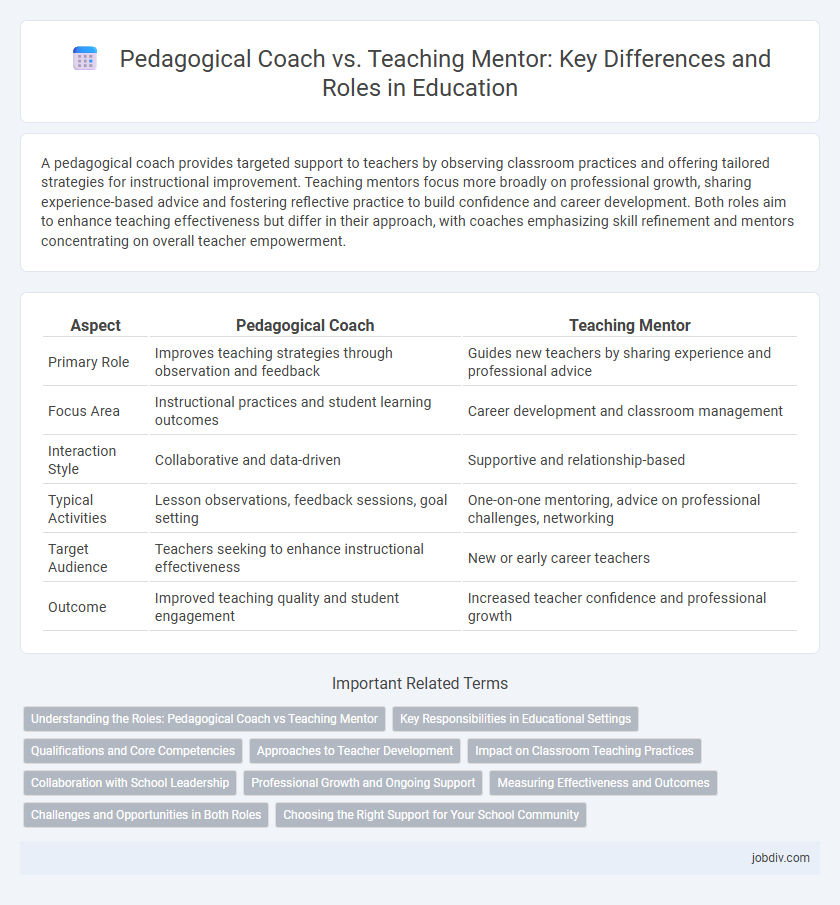A pedagogical coach provides targeted support to teachers by observing classroom practices and offering tailored strategies for instructional improvement. Teaching mentors focus more broadly on professional growth, sharing experience-based advice and fostering reflective practice to build confidence and career development. Both roles aim to enhance teaching effectiveness but differ in their approach, with coaches emphasizing skill refinement and mentors concentrating on overall teacher empowerment.
Table of Comparison
| Aspect | Pedagogical Coach | Teaching Mentor |
|---|---|---|
| Primary Role | Improves teaching strategies through observation and feedback | Guides new teachers by sharing experience and professional advice |
| Focus Area | Instructional practices and student learning outcomes | Career development and classroom management |
| Interaction Style | Collaborative and data-driven | Supportive and relationship-based |
| Typical Activities | Lesson observations, feedback sessions, goal setting | One-on-one mentoring, advice on professional challenges, networking |
| Target Audience | Teachers seeking to enhance instructional effectiveness | New or early career teachers |
| Outcome | Improved teaching quality and student engagement | Increased teacher confidence and professional growth |
Understanding the Roles: Pedagogical Coach vs Teaching Mentor
A Pedagogical Coach focuses on improving teaching strategies and classroom practices through observation, feedback, and targeted professional development, emphasizing skill enhancement and instructional effectiveness. In contrast, a Teaching Mentor provides guidance and support by sharing personal experiences, fostering professional growth, and helping navigate career challenges, prioritizing relationship-building and emotional support. Both roles are essential in educational settings but differ in approach, with coaches driving instructional change and mentors nurturing teacher development.
Key Responsibilities in Educational Settings
Pedagogical coaches primarily focus on enhancing instructional strategies and curriculum implementation to improve teacher effectiveness through targeted feedback and professional development. Teaching mentors provide personalized guidance and support to novice or struggling teachers by sharing practical classroom management techniques and fostering reflective practice. Both roles contribute significantly to teacher growth but differ in approach, with coaches emphasizing skill refinement and mentors focusing on experiential learning and emotional support.
Qualifications and Core Competencies
Pedagogical coaches typically hold advanced degrees in education and possess expertise in instructional design, data analysis, and adult learning theories, enabling them to support teachers in enhancing pedagogical practices through evidence-based strategies. Teaching mentors usually have extensive classroom experience and strong interpersonal skills, focusing on guiding novice educators through practical classroom management, lesson planning, and professional development. Both roles require strong communication, reflective practice, and the ability to foster continuous improvement, but pedagogical coaches emphasize systemic instructional improvement while mentors prioritize individualized teacher support.
Approaches to Teacher Development
Pedagogical coaches emphasize collaborative, data-driven strategies that enhance instructional techniques through ongoing observation and reflective practice. Teaching mentors prioritize relationship-based guidance, relying on experience sharing, emotional support, and personalized feedback to foster professional growth. Both approaches address teacher development but differ in their focus on structured skill refinement versus holistic, mentorship-driven support.
Impact on Classroom Teaching Practices
Pedagogical coaches provide targeted, data-driven feedback that empowers teachers to refine instructional strategies and improve student engagement through personalized professional development. Teaching mentors offer ongoing guidance, sharing experiential knowledge and modeling effective teaching practices to build confidence and classroom management skills. Both roles significantly enhance teaching efficacy by fostering reflective practice and supporting continuous improvement in pedagogy.
Collaboration with School Leadership
Pedagogical coaches collaborate intensively with school leadership to align instructional strategies with school-wide goals, ensuring consistent teacher development and improved student outcomes. Teaching mentors work closely with school leaders to support novice teachers through personalized guidance and feedback, fostering professional growth and classroom management skills. Both roles enhance school leadership initiatives by promoting a culture of continuous learning and reflective practice among educators.
Professional Growth and Ongoing Support
A pedagogical coach offers personalized, data-driven strategies to enhance instructional skills and supports teachers in implementing evidence-based practices for measurable professional growth. A teaching mentor provides experiential guidance and emotional support, fostering reflective teaching practices and cultural acclimatization within the school environment. Both roles contribute to ongoing support by facilitating continuous learning, but coaching emphasizes targeted skill development while mentoring focuses on holistic teacher well-being and integration.
Measuring Effectiveness and Outcomes
Pedagogical coaches use evidence-based frameworks and quantitative data, including student performance metrics and teacher self-assessments, to measure the effectiveness of instructional strategies. Teaching mentors focus more on qualitative feedback through reflective dialogues and classroom observations, emphasizing professional growth and teacher confidence. Both roles contribute to enhanced teaching outcomes, but pedagogical coaches rely heavily on measurable data to drive continuous improvement.
Challenges and Opportunities in Both Roles
Pedagogical coaches face challenges like balancing individualized teacher support with systemic instructional goals, while teaching mentors often navigate building trust and providing experiential guidance. Both roles offer opportunities to enhance teacher effectiveness through targeted feedback and collaborative growth, yet coaches may leverage data-driven strategies whereas mentors rely on practical classroom insights. Navigating role clarity and fostering professional development cultures remain critical for maximizing impact in both pedagogical coaching and teaching mentorship.
Choosing the Right Support for Your School Community
Pedagogical coaches provide targeted instructional strategies and data-driven feedback to enhance teacher performance, while teaching mentors offer personalized guidance and emotional support based on experience. Selecting the right support depends on your school's goals, whether prioritizing skill development or fostering professional growth and confidence. Understanding these distinct roles ensures tailored interventions that effectively meet the needs of your educators and improve student outcomes.
Pedagogical Coach vs Teaching Mentor Infographic

 jobdiv.com
jobdiv.com